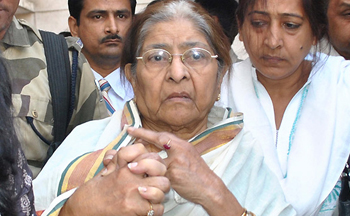Ahmedabad, Dec 26: Narendra Modi gets clean chit in 2002 Gulbarg society case as metropolitan magistrate rejects Zakia Jafri's plea against SIT's clean chit.
A magistrate court in Ahmedabad pronounced its order on Zakia Jafri's petition against Special Investigation Team (SIT) closure report that gave a clean chit to Gujarat Chief Minister Narendra Modi and others in 2002 Gujarat riots.
Magistrate BJ Ganatra had earlier said he would deliver the order on October 28, but it was deferred to December 2, and then to December 26.
Jafri is the wife of former Congress MP Ehsan Jafri, who was among 69 people killed in the Gulbarg Society massacre here during the 2002 riots.
SIT had submitted its report on February 8 last year, clearing Modi’s name in any conspiracy.
She had filed a petition against the SIT report in April seeking its rejection and an order to file chargesheet against Modi and others during the 2002 riots.
Earlier:
Gujarat riots: verdict on Zakia Jafri's plea against clean chit to Modi today
 Ahmedabad, Dec 26: A court in Ahmedabad is likely to deliver its verdict on Thursday on Zakia Jafri's protest petition challenging the clean chit to Gujarat chief minister Narendra Modi and others in the Gulbarg Society massacre case.
Ahmedabad, Dec 26: A court in Ahmedabad is likely to deliver its verdict on Thursday on Zakia Jafri's protest petition challenging the clean chit to Gujarat chief minister Narendra Modi and others in the Gulbarg Society massacre case.
Zakia's husband, former Congress leader Ehsan Jafri, was among the 69 people of Gulberg Society in Ahmedabad, killed by a mob on February 28, 2002.
The court will decide whether the clean chit granted by the Special Investigation Team (SIT) can be upheld as the SIT found no prosecutable evidence against those named in the Zakia's complaint.
Zakia's lawyers had argued that adequate evidence was available to initiate criminal proceedings against Modi and others, who had allegedly conspired to target the minority community after a Muslim mob torched the Sabarmati Express on 27 February 2002 near Godhra in which 59 kar sevaks were burnt to death.
In the subsequent riots across the state, more than 1,000 people were killed under the watch of Modi administration.
In her petition, Zakia has stated that "Modi instructed top officials to allow Hindus to vent their anger on Muslims after the Godhra train burning incident. IPS officer Sanjiv Bhatt's affidavit supports this allegation. Modi indulged in hate speeches that amounted to creating enmity between communities. Ministers were posted at police control rooms to interfere with effective police functioning."
Following the September 2011 Supreme Court order, the SIT filed a closure report in the magisterial court in February 2012.
SIT lawyer RS Jamuvar had said that the investigative agency did not find any evidence against Modi and hence the closure report had been filed.
The SIT disregarded the affidavit of Sanjiv Bhatt against Modi.





Comments
Add new comment